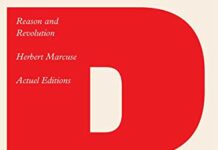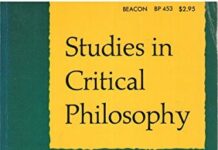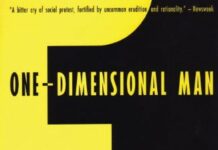
Ebook Info
- Published:
- Number of pages:
- Format: PDF
- File Size: 0.62 MB
- Authors: Herbert Marcuse
Description
Philosophy
User’s Reviews
Reviews from Amazon users which were colected at the time this book was published on the website:
⭐Herbert Marcuse (1898-1979) was a German philosopher, sociologist, and political theorist, associated with the Frankfurt School of critical theory, until he moved to the United States in 1934. (He was even briefly one of the “darlings” of the Student Movement of the 1960s.# He wrote other books, such as
⭐,
⭐,
⭐,
⭐,
⭐,
⭐, etc.He wrote in the Foreword, “Many of the essays collected here were written in the years from 1934 to 1938. They developed out of my work at the Institute for Social Research in New York and were formulated in discussion with my friend Max Horkheimer… I have let them be republished unchanged. No revision could bridge the chasm that separates the period in which they were written from the present one. At that time, it was not yet clear that the powers that had defeated fascism by virtue of their technical and economic superiority would strengthen and streamline the social structure which had produced fascism…. Capitalist society had not yet revealed all its strength and all its rationality, and the fate of the labor movement was still ‘uncertain.’ … The focal point is the interpretation of some of the leading ideas of intellectual culture—of ideology… the essays dealt with the legacy of idealism, with the element of truth in its repressive philosophy. But the legacy and truth of materialism, and not only historical materialism, were of equal import.”He asserts, “Existentialism collapses the moment its political theory is realized. The total-authoritarian state for which it longed gives the lie to all its truths. Existentialism accompanies its debacle with a self-abasement unique in the history of ideas, bringing its own history to an end as a satyr play. In philosophy existentialism begins as the antagonist in a great debate with Western rationalism and idealism… It ends by radically denying its own origin; the struggle against reason drives it blindly into the arms of the powers that be.” (Pg. 40)He observes, ‘Civilization and Culture’ is not simply the translation of the ancient relation of purposeful and purposeless, necessary and beautiful. As the purposeless and beautiful were internalized and, along with the qualities of binding universal validity and sublime beauty, made into the cultural values of the bourgeoisie, a realm of apparent unity and apparent freedom was constructed within which culture in which the antagonistic relations of existence were supposed to be stabilized and pacified. Culture affirms and conceals the new conditions of social life.” (Pg. 95-96)He argues, “There is a kernel of truth in the proposition that what happens to the body cannot affect the soul. But in the established order this truth has taken on a terrible form. The freedom of the soul was used to excuse the poverty, martyrdom, and bondage of the body. It served the ideological surrender of existence to the economy of capitalism. Correctly understood, however, spiritual freedom does not mean the participation of man in an eternal beyond where everything is righted when the individual can no longer benefit from it. Rather, it anticipates the higher truth that in this world a form of social existence is possible in which the economy does not preempt the entire life of individuals. Man does not live by bread alone; this truth is thoroughly falsified by the interpretation that spiritual nourishment is an adequate substitute for too little bread.” (Pg. 109)He says, “The concept of ideology has meaning only when oriented to the interest of theory in the transformation of the social structure. Neither a sociological nor a philosophical but rather a political concept, it considers a doctrine in relation not to the social conditions of its truth or to an abstract truth but rather to the interest of transformation. Countless philosophical doctrines are mere ideology and, as illusions about socially relevant factors, readily integrate themselves into the general apparatus of domination.” (Pg. 140)He explains, “Critical theory’s interest in the liberation of mankind binds it to certain ancient truths. It is at one with philosophy in maintaining that man can be more than a manipulable subject in the production process of class society. To the extent that philosophy has nevertheless made its peace with man’s determination by economic conditions, it has allied itself with repression. That is the bad materialism that underlies the edifice of idealism.” (Pg. 153)He points out, “I mentioned, as the most conspicuous social mobilization of aggressiveness, the militarization of the affluent society. This mobilization goes far beyond the actual draft of manpower and the buildup of the armament industry: its truly totalitarian aspects show forth in the daily mass media which feed ‘public opinion.’ The brutalization of language and image, the presentation of killing, burning, and poisoning and torture inflicted upon the victims of neocolonial slaughter is made in a common-sensible, factual, sometimes humorous style which integrates these horrors with the pranks of juvenile delinquents, football contests, accidents, stock market reports, and the weatherman. This is no longer the ‘classical’ heroizing of killing in the national interest, but rather its reduction to the level of natural events and contingencies of daily life.” (Pg. 259)These essays will be of keen interest to anyone studying Marcuse.
⭐o.k.
⭐Just wow. Want to understand critical race theory? This provides the historical context.
⭐Faz parte da minha pesquisa
⭐
Keywords
Free Download Negations: Essays in Critical Theory in PDF format
Negations: Essays in Critical Theory PDF Free Download
Download Negations: Essays in Critical Theory PDF Free
Negations: Essays in Critical Theory PDF Free Download
Download Negations: Essays in Critical Theory PDF
Free Download Ebook Negations: Essays in Critical Theory





